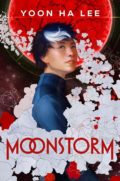The conqueror king was always hungry, that was what they said. He had a high crown of beaten gold savage-bright with charnel rubies and spinels and garnets, the roast browns of deep amber and hard-edged topaz. He had robes of prickly brocade lined with the furs of rare animals: the boar with involute tusks, the crested stag, even the black-and-gold leopard that spoke prophecies at the turning of the year. (That last he only wore for religious occasions.)
And he had a table at his high hall, itself hung about with bramble-branches made of bronze wire and glinting copper leaves. The platters were piled high with slabs of meat carved from the great cattle of the valley, glazed thick with sour-sweet sauce of apricots. Bowls of rice steamed jasmine-fragrant next to delicate fishcakes topped with slant-cut greens that grew only in the king’s gardens. Not much in the way of desserts, to be sure. The king didn’t have much of a sweet tooth; he considered blood and fire the sweetest of all. The cooks had their own thoughts about this, especially a certain pastry chef who never got to bake the cookies of her heart’s desiring, but they kept those to themselves.
But most luxurious of all were the dishes reserved for the king. For the king held feasts great and grievous every time he conquered one of the small city-states that bordered his nation. Sorcerer-priests served him who fashioned chalices of rough clay to commemorate each victory, and the lifeless hands of the vanquished queens, kings, generals were pressed against the red clay. The king drank spiced dark wines from some of these chalices, and broths of blood, and nourished himself on the knowledge of his stature.
And even so, the king hungered.
He turned again to his sorcerer-priests. He liked to look at the stars: at the hunter constellation that was bright in the winter sky, at the hunter’s starry intimation of dagger at belt, of bow, of arrows. I will devour the spirits that live in the house of the stars, he said, and set them to making him a new set of chalices.
People in the conqueror king’s country looked at the sky at night then, and were afraid: they did not know from one evening to the next whether there would be holes in the sky, where the blush of nebulas and the glitter-scatter of stars would shine no more. But they could not speak against the king.
Or anyway, they couldn’t speak against the king publicly. But the pastry chef saw the haunted look even in the eyes of the sorcerer-priests, whom she had suspected weren’t nearly as terrible as most people thought they were. She went to her home in the servant’s quarters in the evening and spoke to her grandmother, who had, in the days of the conqueror king’s more peacefully inclined father, been a poet of some note.
“I must go to court,” the poet said as she rummaged through her closet for some of her old finery. She had kept it in good condition, and while it would be out of fashion, why, she was old enough not to care about such things.
So the poet went to court, despite all the pastry chef’s attempts to dissuade her, and while most people didn’t recognize her, some of the older sorcerer-priests knew her by the beautiful blue-and-gold robe she wore. She went up to the high table, as casual as you please, and the king, noting the stranger (he didn’t recognize her either), ordered her brought before him. He asked who she was and what she thought she was doing there.
The poet looked at the collection of chalices and held out her hands. She had not eaten poorly, these past years; but she had not eaten abundantly, either. Her bones, however fine, were clearly visible through her fine skin. “Most people have to be satisfied with being hungry the old-fashioned way, sire,” the poet said, very dryly.
“I have transcended hunger,” the king said, not yet angry. Probably he saw the poet as a novel form of challenge to be conquered.
“That’s very good for you, sire,” the poet said. “In that case, I would beg a bowl of rice from your table, and I won’t trouble you again.”
Still not angry, he acceded to this, and had his servants ensure that the bowl was a generous one; he would not have it said that he was a miser in his gifts, on the occasions that he chose to give any.
The poet thanked him for the rice and left. She ate well that night. And she never returned to the king’s hall, which she considered satisfactory.
As for the king, he determined to forget the woman, but her remarks were an irritant that bothered him more and more as the days went by. At last he found out who she was, and demanded to have her brought before him in the hopes that she would have some solution to his neverending hunger, but by then she had retired to some monastery in the mountains (so they said), and even the king’s threats could not uncover her location. Vexed, the king gave up his exotic tastes and began eating only (mostly) rice in an effort to find out what the old poet knew. He never did figure it out.
For Nancy Sauer. Prompt: the constellation Orion.
Wikipedia on Orion (constellation) was inspirational, particularly the segment on the Pharaoh Unas. I wouldn’t cite Wikipedia in an academic paper, but for secondary world inspiration, it’s great.
